- Home
- Johnny D. Boggs
The Cane Creek Regulators
The Cane Creek Regulators Read online
THE CANE CREEK REGULATORS
THE CANE CREEK REGULATORS
A Frontier Story
JOHNNY D. BOGGS
Copyright © 2014 by Johnny D. Boggs
E-book published in 2017 by Blackstone Publishing
Cover design by Alenka V. Linaschke
Cover art © Mark J. Grenier/Adobe Stock;
© ilolab, vadim.ivanchin/Shutterstock
All rights reserved. This book or any portion thereof may not be reproduced or used in any manner whatsoever without the express written permission of the publisher except for the use of brief quotations in a book review.
Trade e-book ISBN 978-1-4708-6158-2
Library e-book ISBN 978-1-4708-6157-5
CIP data for this book is available from
the Library of Congress
Blackstone Publishing
31 Mistletoe Rd.
Ashland, OR 97520
www.BlackstonePublishing.com
For Walter Edgar
1766
Chapter One
Emily ran.
She wanted to scream, but didn’t think she had enough breath. Besides, what was the use? Hours earlier, she had crossed Spring Branch and traveled so far down the Cherokee Path that, when the renegades surprised her, no one back in Ninety Six could have heard her. Even the warblers and grasshopper sparrows that had been singing that morning had flown away.
The three men had startled her, silently appearing from behind a giant Oglethorpe oak on the other side of the trail. Two wore beards and greasy buckskins, while the other was clean-shaven, all dangerous. All carried hatchets and knives in their belts, and each held a rifle.
“She’s a devilish good piece,” the one with the leather eye patch had said.
When they surprised her, Emily had been on her knees beside a ditch, filling a tin pail with blueberries. She had almost screamed, but the fat man with the blubbery cheeks had brought a finger to his lips, smiling, telling her, “Keep your breath to cool your porridge.” That had stopped her from crying out. That and the fact that the third man, the tall, dark one donning a ribbon shirt and calico turban of the Cherokees, had tossed his long rifle to Eye Patch, and slowly, noiselessly moved toward her, his eyes as hypnotic as a rattlesnake’s.
They could be long hunters, merely on their way to the tavern at Ninety Six, she tried to tell herself, but Emily knew better.
“Ain’t you the moon-eyed hen?” The Cherokee had broken the silence, flashed her a black-toothed grin while unbuckling the belt that held his knife and hatchet. Eye Patch and Blubber Cheeks had laughed.
Which is when she overcame her paralysis, grabbed the pail, and flung it, blueberries and all, into the Cherokee’s face. As soon as the pail left her hands, before she even heard the pail strike and the Indian cuss, she had gathered her legs, leaped across the ditch, and fled into the woods. Into the timbers, dodging hardwood trees, crushing saplings under her feet, feeling the briars and brambles rip at her dress, her skin. A branch knocked off her bonnet, and she felt a trickle of blood run through her blonde hair. Her lungs burned. She bent over, kept moving, turning, and spinning, deeper into the forest, leaping over rotting trees, over a sinkhole. Dashing …
To nowhere.
Emily knew her mistake. She should have stayed on the Cherokee Path, headed back to Spring Branch, north and west to Ninety Six, where she would have been certain to run into some trader or settler. Or even south on the path until it merged with the trail to Keowee. Yet for all she knew, other blackhearts might have been posted down the trail to intercept her if she fled. Heading into the woods had been a foolish notion, a decision fueled by panic. She could hear the men’s feet crushing the leaves and twigs behind her. Gaining on her.
She couldn’t hide. The marauders were too close. Darkness would not come for hours, so she wouldn’t live long enough to see this day’s sun set. Her decision had cost Emily her life, and she hated herself for being so careless, so foolish, for acting like a frightened child.
On that warm summer morning, sixteen-year-old Emily Stewart was living in the backcountry, having settled there with her family barely six years after Robert Gouedy had opened the trading post in the district. Many Charlestown traders thought Gouedy’s post lay ninety-six miles south of Keowee, a major Cherokee town, hence the settlement’s name: Ninety Six. No hyphen. Emily’s father often joked that the hyphen had been the first thing Gouedy had traded for a sizable profit.
In 1754, her father had left Georgetown to build a tavern near Gouedy’s post. Three years later, Breck Stewart had returned to fetch Emily, her mother, and brother to the frontier. Another brother and a sister had been born since they had settled in the hilly forests of South Carolina.
With the exception of several months during a war with the Cherokees a few years back, Emily had been living on the frontier for nine years. She knew what life was like in the backcountry. She was no fool. During that time, she had seen just how far away Ninety Six was from the landed gentry of the Carolina coast, where women dressed in fine silk, carried parasols and fans to protect their features from the heat and men donned white wigs, fancy waistcoats, and cocked hats. Ninety Six and the backcountry were peopled with women in homespun and men in buckskins, often a rough lot. How often had she heard her father complain to Gouedy about the scoundrels and wastrels who raided the settlers, the traders, who robbed, plundered, killed.
And, sometimes, they committed the most unholy of sins.
As she ran, Emily kept telling herself that she was a Stewart, and not just any Stewart, but a Stewart of Appin, as her father so often reminded her. Breck Stewart could tell stories of his ancestors that dated to the fourteenth century in the Gaelic West. Stewarts had fought at Halidon Hill, Inverlochy, and at Sheriffmuir. Emily’s family traced its heritage and bloodline to Duncan, the second Stewart of Appin, who had built Castle Stalker on the Cormorant’s Rock at Loch Linnhe. In 1726, her grandfather and grandmother had sailed from Glasgow to America with two young sons merely for the adventure of settling in the New World. That same blood with its love of adventure coursed through Breck Stewart’s veins, and had brought him and his family from the safety and wealth of Winyah Bay to the wilderness of Ninety Six District.
Emily Stewart’s heart pumped the same blood, which now dried in her hair and appeared on her arms and hands from the scratches left by sharp briars.
Imbecile! She ground her teeth, loathing herself, and lowered her head while raising an arm, the sleeve of her dress ripped and ragged, to slap away another branch. She circled an oak, moved in another direction, but which way she ran, she didn’t know. Here the forest grew so thick, the trees so high, she couldn’t see the sun. She wasn’t only being chased by three vermin, she was totally lost.
She opened her mouth, sucked in air and gnats. She tried to spit, but couldn’t do anything but swallow, and keep moving, dodging, sweating. But this deep in the forest, the trees and brush thickened, and it became harder to run. She felt herself slowing, then saw the clearing, stepped into it, and felt the breath knocked out of her.
Landing on her back, she opened her eyes, lungs screaming for air. At first, she saw only streams of light, orange, red, white, flashing across the blackness. When her vision cleared so that she could see the green canopy of trees above, the tall Cherokee stepped into her line of sight.
Beads of sweat peppered his forehead. His turban was gone, and, like her dress, his ribbon shirt had been torn. The Indian must have left his belt behind, along with the knife, but he had managed to pick up his hatchet.
Her eyes studied the weapon’s deadly iron blade.
Chest still heaving, the Cherokee wiped the sweat off his brow, and stepped over her, his moccasins pressing against the sides of her blouse. The sound of dead leaves being crushed grew nearer, and the Indian lifted his head, but only for a moment, before he looked down at Emily. Slowly he knelt, lowering himself onto her stomach.
A man bolted out of the woods, but Emily couldn’t see him. Didn’t have to see him, for when he spoke, she recognized the voice.
“She runs …” Eye Patch had to catch his breath, “like a … damned … deer.”
The Cherokee ignored him. He set his hatchet on the ground, then leaned over, his hands gripping the collar of her dress. “Let’s see your wares, child,” he said, his mouth just inches from her face.
Behind her, the hard-breathing man croaked out a laugh.
She had expected the Cherokee’s breath to reek, considering his rotten teeth, but to her surprise it smelled of the mead her father often served in the tavern. Sweet. Of honey. Although frozen in fear, Emily bit her bottom lip. She wanted to close her eyes. She wanted to die right then and there. But then the Cherokee looked up. Emily felt his fingers tighten on the folds of her dress. Her fists clenched.
He seemed about to say something to his friend, but abruptly he straightened, his hands releasing Emily’s dress. His hands went up, reaching behind his back at something that he couldn’t quite grasp. He still sat atop her, but his body began trembling, the dark face paling.
“Ashwin!” Eye Patch called out from the edge of the timber. Then louder, in a voice filled with terror, “Great God!”
Not until that moment did Emily notice the bloody obsidian point of a spear protruding from the Indian’s chest. He was trying to stand, somehow coming off Emily’s stomach as blood began seeping from the corners of his mouth. He moved his lips as if her were attempting to speak, but then his eyes rolled into the back of his head and he fell hard to the side, death rattling in his final breaths.
A war whoop followed. Emily rolled over, came up to her knees as a new figure, a young man in deerskins, rushed from the woods. Behind her, Eye Patch screamed, cursed, and Emily heard the metallic click as the blackheart tried to cock the long rifle. A savage grunt sounded as the young man slammed into Eye Patch. Emily whirled around.
The newcomer straddled Eye Patch, who was reaching up with his free hands, clawing for the young man’s eyes. One hand gripped the throat. Emily’s young savior turned his head, reached for the knife.
Recognition came dully, and her lips parted. Emily knew this boy, a Cherokee about her own age. He brought many animal pelts in to Robert Gouedy’s trading post.
“Go-la-nv.” Her mouth moved, but she doubted if anyone had heard her. Yet she had no doubt. This was Go-la-nv Pinetree of the Deer Clan Cherokees.
She recalled something else. She remembered that she was Emily Stewart of the Stewarts of Appin, and she was not helpless. She looked to her side, saw the dead Indian, his blood pooling among the dead leaves. Her right hand found the hatchet, and she gripped it, took a step toward Go-la-nv Pinetree and Eye Patch, and stopped. Pinetree had found his own stone tomahawk, which he brought down on Eye Patch’s head.
Immediately Pinetree leaped off the body of the man whose skull he had just crushed. He turned, spotted Emily, said, “Are you … all right?” The voice was guttural, urgent, but the words perfect English.
The hatchet slipped from her grip, dropped onto the soft ground. She blinked, trying to think, her head bobbing slightly. Suddenly her eyes widened, and her lips parted. She tried to scream a warning, but Go-la-nv Pinetree was already turning at the sound behind him.
Too late, Blubber Cheeks stormed out of the woods, panting, breathless, dripping with sweat. His huge body slammed into the thin shape of the young Cherokee.
Emily blinked. The big man straddled Pinetree, who turned his head, screaming at Emily, “Run! Run!”
Blubber Cheeks’ fat hands cut off anything else the Cherokee could say.
“You … unclicked … cub!” Blubber Cheeks spit into Pinetree’s face. “I’ll … kill you … you stinking … bastard.”
Emily turned. She leaped over the dead Cherokee’s legs, and was ready to start back into the thick forest, out of this clearing that already smelled of blood and excrement and death. She would follow Pinetree’s advice. Get out of there.
Run! Run!
Yet she had not gone more than ten steps before she made herself stop. She was still lost. She didn’t even know if she could make it back to Ninety Six. But something else made her turn back to the two men scuffling in the clearing. Go-la-nv Pinetree had saved her life. She could not, would not, leave him to be strangled by a fat lout like Blubber Cheeks. By Jehovah, she was Breck Stewart’s daughter. She was Emily Stewart.
No longer breathing heavily, no longer stunned, Emily turned back, again stepped over the dead Cherokee. Moving with intense purpose, she paused only long enough to scoop up the Indian’s hatchet.
“Puny … little … cur.” The fat man’s thumbs pushed into Pinetree’s throat. “I’ll gut you … like a … fish. Take … your … scalp.”
She stood behind him, the hatchet raised over her head. No, she told herself, not like this. It was not fitting for a warrior of Appin. Go-la-nv Pinetree looked into her eyes, and she could see that he was still telling her to run. She ignored him.
“Hey!” she yelled. “You fat piece of dung!”
The fat man whirled, keeping one hand on Pinetree’s throat but with the other reaching for the pistol stuck in his belt behind his back. He looked at Emily, and yelled, “You young tatterdemalion!” He almost laughed, until his eyes settled on the sharp-bladed trade hatchet. Quickly he released his left hand, bringing it up in a defensive move, his right hand still fumbling for the pistol.
He screamed something, but Emily refused to listen, hearing only her own voice, “Creag an Sgairbh!” Emily’s grandfather had taught her that Gaelic battle cry. The rallying cry of Scottish warriors. The name her father had given his tavern. Cormorant’s Rock. The homeland of the Stewarts of Appin since James IV, King of Scotland, had appointed Duncan, second Stewart of Appin, as the chamberlain of the Isles.
The hatchet came down savagely, striking Blubber Cheeks in his forehead so hard she had to let go of the hickory handle. The blow silenced the fat man’s yells. His eyes seemed to cross and focus on the handle, as blood poured down his face.
Emily stepped back, heart pounding, and watched the fat man topple onto his side. She swallowed down the bile rising in her throat, refused to look at the scavenger she had just killed, and took a tentative step forward, then extended her hand to help Go-la-nv Pinetree to his feet.
Chapter Two
“We are descendants of freeborn Britons,” Breck Stewart said, “loyal to the Crown, yet we find ourselves in a state of barbarism and degeneracy and often at the mercy of the profligate, impudent, and audacious horse thieves, cattle stealers, hog stealers, and such bold and dangerous scoundrels who hold all order and decency in contempt.”
Donnan Stewart, Emily’s older brother, leaned over, giving her a nudge and whispered, “When shall Da pin up the basket? He has been talking for an hour already.”
Emily shoved him away. “Don’t be such a noodle,” she said softly but sharply.
Donnan often acted silly, though he more often came across as surly. She tried to remind herself that her brother meant well, was not complaining, but rather was merely trying to make Emily relax, maybe even smile, hoping to get her mind off what had happened in the woods that morning.
Or maybe he was just bored. She wasn’t sure she could hold that against him. For months, probably for better than a year now, they had been listening to their father state this same case, over and over. Nothing more than words. It was only just a month ago that he had gathered the settlers at the tavern after Alroy O’Fionnagáin’s barn had been burned to make hi
s same argument.
But today seemed different. Breck Stewart sounded different, and Emily had never seen him so angry—his face a heated red, his ears even darker. His eyes flamed with a hatred that frightened her almost as much as had those three blackhearts in the woods.
The two dozen men and women who were crowded tonight inside the tavern did not look bored. Practically everyone within shouting distance of Ninety Six had converged on Cormorant’s Rock. Emily spotted Virgil Hickox and his wife standing beside Thomas Taylor, who had risen from bed with a sick stomach to attend the meeting. Even Ninety Six’s sole freedman, Benjamin Cooper, stood beside the doorway.
Breck Stewart may have enticed many men to the tavern with the promise of free bumbo—Stewart’s special drink of rum, water, and sugar—or persico, his cordial blended with mashed peaches. Yet few of those gathered today had even lifted their noggins once Stewart had begun to speak.
Emily watched as her father sat down on a keg, but kept on talking. His black, buckle shoes must have begun pinching his feet. Robert Gouedy had told him many times he should wear moccasins, but Stewart refused to give up his shoes, probably the last tie he had to Georgetown, the Atlantic coast, and civilization. His shirt was osnaburg, dyed brown, his forest green waistcoat was missing most of its buttons, and his tan breeches were patched and tied up just below the knees, revealing a pair of unmatched plaid stockings.
He looked around the room, settling his gaze on Alroy O’Fionnagáin, whose head bobbed in agreement with everything Stewart said. Then he singled out Robert Gouedy, who sat still, elbows on the table and hands clasped. And when he looked at the redheaded Ferguson—Emily could never remember the man’s Christian name—the burly hog farmer frowned, closing his eyes at the memory of the attack on his place last winter.
Finally Breck Stewart’s speech ended, and he made his way back behind his bar where he filled a stein with the mead he brewed himself.

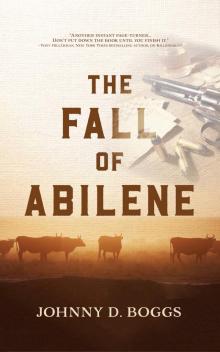 The Fall of Abilene
The Fall of Abilene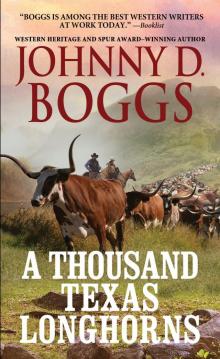 A Thousand Texas Longhorns
A Thousand Texas Longhorns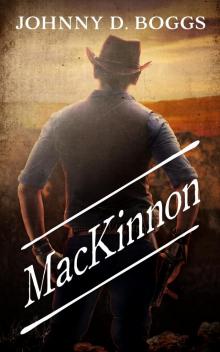 MacKinnon
MacKinnon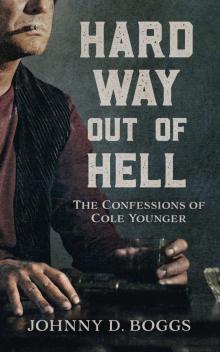 Hard Way Out of Hell
Hard Way Out of Hell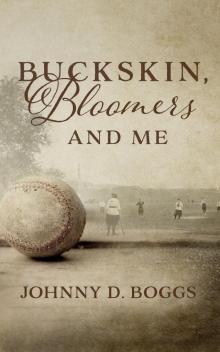 Buckskin, Bloomers, and Me
Buckskin, Bloomers, and Me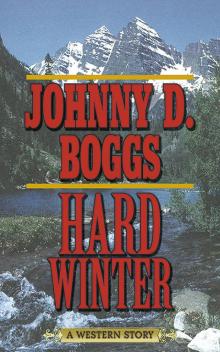 Hard Winter
Hard Winter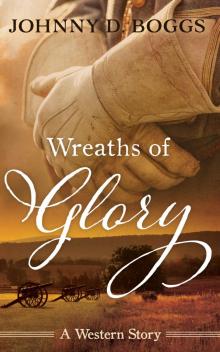 Wreaths of Glory
Wreaths of Glory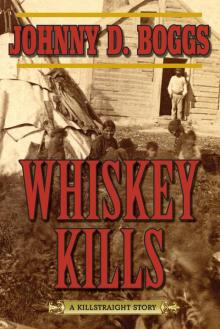 Whiskey Kills
Whiskey Kills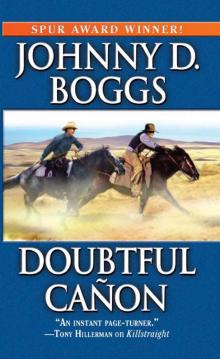 Doubtful Canon
Doubtful Canon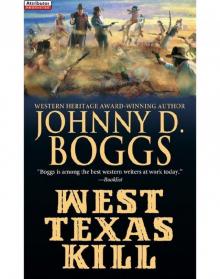 West Texas Kill
West Texas Kill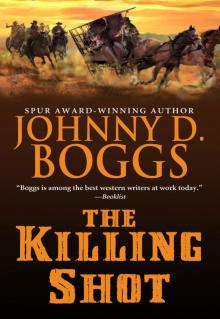 The Killing Shot
The Killing Shot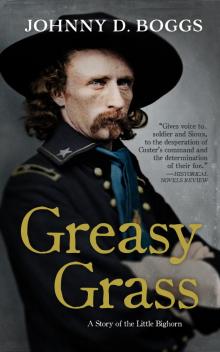 Greasy Grass
Greasy Grass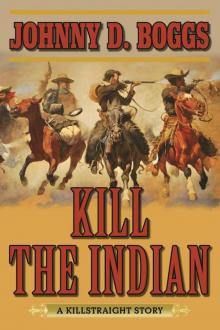 Kill the Indian
Kill the Indian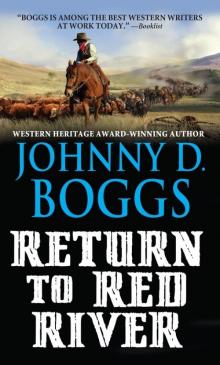 Return to Red River
Return to Red River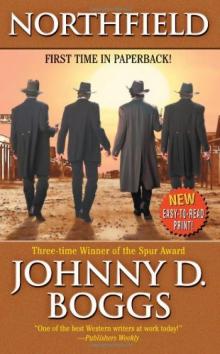 Northfield
Northfield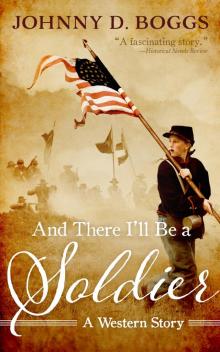 And There I’ll Be a Soldier
And There I’ll Be a Soldier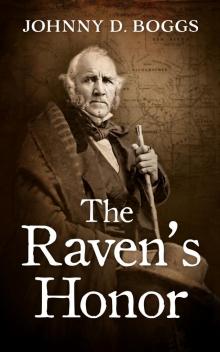 The Raven's Honor
The Raven's Honor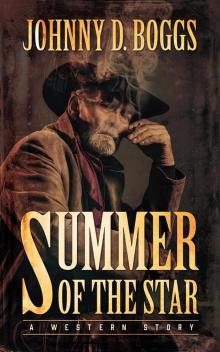 Summer of the Star
Summer of the Star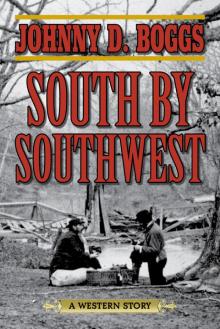 South by Southwest
South by Southwest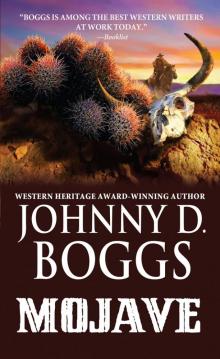 Mojave
Mojave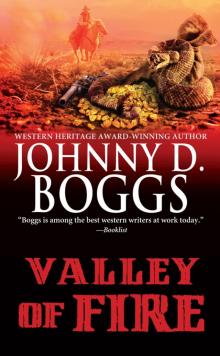 Valley of Fire
Valley of Fire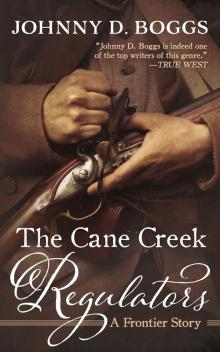 The Cane Creek Regulators
The Cane Creek Regulators